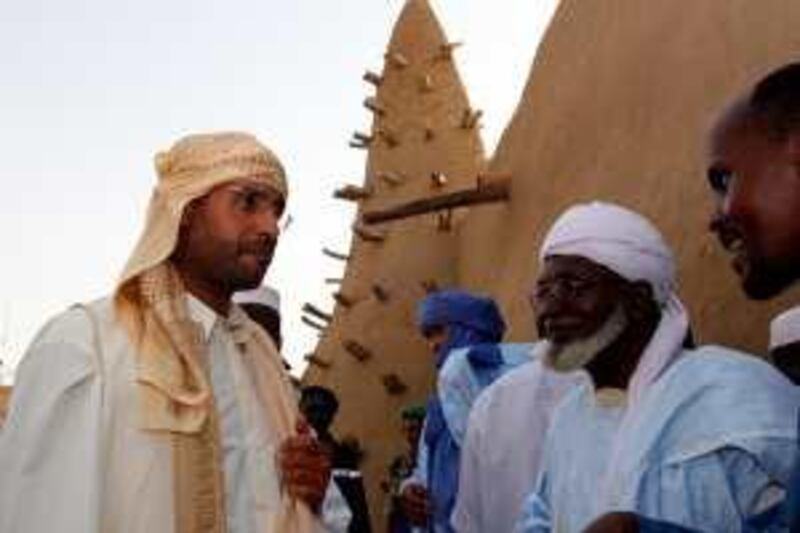RABAT // In a closed-door speech last Tuesday in Sabha, an oasis city in south-west Libya, the country's leader, Muammar Qadafi, hit old-guard administrators with a startling request: a government job for his reformist son, Saif al Islam. The younger Qadafi's lack of such a role "is obstructing his work on behalf of Libya", the Libyan leader said, according to a local newspaper. Articulate, reform-minded and long considered a potential political heir to his father, Saif al Islam, 37, has been an influential force in Libya and its unofficial interlocutor with the West. But that role is diminishing as Tripoli rebuilds diplomatic ties with western countries, leaving Saif al Islam vulnerable to a resurgence of hardliners that his entry into government would do little to derail, analysts say.
Mr Qadafi had billed the speech as "secret", but his remarks were reported by Libya al Youm, a Libyan online newspaper that gave as its source an audience member. Abdelmajid al Dursi, the chairman of Libya's state media company, said he could neither confirm nor deny the report. Ronald Bruce St John, a Libya expert with Foreign Policy in Focus, a think- tank that is part of the Washington-based Institute for Policy Studies, said: "I see this as a face-saving move for Saif, an attempt by Qadafi to balance the political equation. There remain elements of Libyan government that favour a more liberal economy and society."
While Mr Qadafi is unquestionably top dog in Libya, his power depends partly on his skill at "playing various elements of society off one another," Mr St John said. Mr Qadafi's audience last Tuesday included both elected officials and Libya's powerful revolutionary committees, appointed bodies known for their devotion to the committee-based system of government. "It's hard to imagine that they're going to give a position to Saif al Islam that would strengthen his campaign for reform," said John Hamilton, a contributing editor for Africa Energy magazine in the UK. "But it's unpredictable."
Mr Qadafi himself burst onto the scene in 1969 as a 27-year-old army captain, toppling a pro-western king, banning political parties and reorganising Libya as a jamahiriya, a system of grassroots councils with himself as Brother Leader and Guide of the Revolution. Shunned for decades by the West for its support of militant groups, Libya has since repaired relations with the United States, Britain and other countries, has seen international sanctions lifted and currently holds a seat on the UN Security Council.
As skyscrapers go up along the Tripoli waterfront, Libyans are basking in a political and economic opening that has brought foreign tourists and companies to Libya. Mr Qadafi has gone from success to success over the past year, being elected to chair the African Union, celebrating 40 years in power and giving his first address to the UN General Assembly. The same period has seen Saif al Islam increasingly sidelined as his role as an unofficial diplomatic channel has been superseded.
Mr Qadafi's direct bid to conjure an official post for his son "illustrates the difficult position that Saif al Islam has currently within the ruling structure", Mr Hamilton said. An initiative by Saif al Islam last year to draft a new constitution that would modernise the jamahiriya system has gone nowhere, while calls to investigate disappearances of political dissidents during the 1970s and '80s have alarmed some conservatives in government, Mr Hamilton said. "That was an attack on the old guard, and the old guard fought back."
Saif al Islam's conservative younger brother, Mutassim, has prospered, becoming a security adviser to Mr Qadafi and travelling to Washington in January to meet the US secretary of state, Hillary Clinton. Musa Kusa, a former intelligence chief seen as a mentor to Mutassim, has been named foreign minister. The shifting balance of power in Tripoli is reflected by tightening state control of the oil market, Libya's main asset and the arena for much of its dealings with foreign companies and governments.
In January, Mr Qadafi threatened to nationalise the oil industry, citing oil prices that plummeted to US$32 (Dh118) a barrel in December from $147 in July. Although Libya is unlikely to go that far, the climate for international oil companies has become harsher in recent months, analysts said. Last month Libya manoeuvred Verenex, an independent Canadian firm active in the country, into accepting a government buyout after using stalling tactics to kill a higher bid by the China National Petroleum Corp. "When Libya began nationalising its oil industry in the 1970s, they started by picking on small independent companies like Verenex," Mr St John said. He called last month's buyout "a highly significant and political move".
Last month also saw the sudden resignation of the head of Libya's national oil company, Shokri Ghanem, a political ally of Saif al Islam whom Mr Qadafi credited with streamlining the oil market and opening it to international firms. The government has since created the Supreme Council for Energy Affairs to oversee the oil industry. Among its members is Mutassim Qadafi. "Now the energy sector is going to be overseen by a body in which Mutassim has a say," Mr Hamilton said. "That's a major shift."
jthorne@thenational.ae





